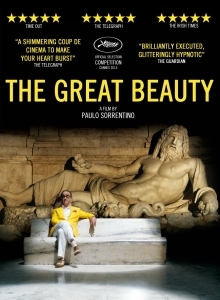The Great Beauty: A visual feast

Navyo reviews Paolo Sorrentino’s film ‘La Grande Bellezza’.
Even though The Great Beauty (La Grande Bellezza, dir. Paolo Sorrentino) won the Best Foreign Film Oscar in 2014, over 2 years ago, the film does not age, neither is it particularly set in any age. There are no cars, no gadgets, no mobile phones, no clothes that establish it an era. It could be anytime in the last 70 years.
This is a film about loss and resurrection in disguise. It’s a surprisingly touching story that provokes a sense of almost bewildering wonder as we see life through the eyes of its main character, the writer, Jep, perfectly played by veteran actor Toni Servillo. Servillo is a master of expression with a face that deserves every close-up. He is truly a wonder to watch.
Jep has lost his creative spark. He’s become a jaded playboy hosting parties on the roof of his apartment overlooking the Colosseum. Yet something stirs inside him when he emotionally connects with the fragility of other human beings. He’s in search of what lies “beyond the blah, blah, blah”. He’s in search of the Great Beauty.
There are several key moments when we see his still, emotionless face looking, almost yearning, as tears well up in his eyes. It’s as if he is silently asking, “Is this the Great Beauty? Have I found it?” These are bittersweet scenes where one cannot help but empathize.
Non-verbal connections between characters and with the camera are a thread that runs through this film. This direct approach amounts to a very intimate experience as a filmgoer. Watching the film — and being watched — you become part of it rather than just a passive observer being entertained. It’s a striking technique that draws you in.
The cast of characters in The Great Beauty range from nuns to strippers, from plastic surgeons to pimps set in the context of a writer and the publishing world. It doesn’t hold back. Rome itself is a character in the film. It is represented in all its cinematic glory and is a wonder to behold. It’s majestic and jaw-droppingly beautiful. Without it, the film would not work as well or even at all.
Romans whom I have spoken to do not care much for this film as they feel it portrays Rome as filled with lurid low-life lotharios with little or no morality. I could not disagree more. Sure, the film contains a degree of satire not to be taken literally, and maybe this is the misunderstanding. But there are so many moments of aching depth and sheer humanity in this film that it’s unfortunate it gets a bad rap by the city it represents.
The comparisons to Fellini are obvious and this is partially what earned this film its Oscar. It’s in the tradition of classic Italian cinema. True to Italian form, the film has style. The characters are all dressed as one would expect in Rome. The cinematography is stunning, every scene worthy of a frame. Yet even though it’s a visual feast, with every scene relishing its location, that’s just the dressing for the human dilemma beneath. “Who am I? What is this life?”
The Great Beauty is worth repeated viewings as there is simply too much to take in the first time round. It’s a sensory overload of beauty and the vast spectrum of humanity. By the third viewing, more of the subtle nuances show themselves.
And then there’s the music. From the classics of John Tavener, Arvo Part, Henryk Gorecki and David Lang to the deep house beats of electronica, it’s a perfect soundtrack that underscores the emotion of the film. But it’s the repeated theme of Vladimir Martynov’s The Beatitudes played by the Kronos Quartet that gives the film its tenderness. Innocent yet filled with heartache and yearning, it’s clearly intended to touch the soul and open the viewer to the truth behind the mask of the social life of Rome, behind the mask of being human.
This remarkable film truly lives up to its title.
Review by Navyo Ericsen, a regular contributor to this magazine
More articles by this author on Osho News
- Log in to post comments
- 21 views
